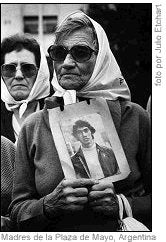| Until recently, it seemed that if you killed one person, you went to jail, but if you slaughtered thousands, you usually got away it. Times change. |
 Justice is essential to the human rights cause. It provides a measure of respect for the victims of serious abuse. And punishes those who commit atrocities. Justice helps societies come to grips with the past and move forward. And it promises to save lives by deterring at least some of tomorrow's torturers. Justice for yesterday's crimes supplies the legal foundation needed to deter atrocities tomorrow.
Justice is essential to the human rights cause. It provides a measure of respect for the victims of serious abuse. And punishes those who commit atrocities. Justice helps societies come to grips with the past and move forward. And it promises to save lives by deterring at least some of tomorrow's torturers. Justice for yesterday's crimes supplies the legal foundation needed to deter atrocities tomorrow. In many countries, however, justice is not a realistic option. The human rights movement can shame and stigmatize abusive governments. We can generate diplomatic and economic pressure to respect human rights. But until recently, we could not credibly threaten despots in these countries with trial and imprisonment. In the past decade, the human rights movement helped to create new precedents and procedures to chip away at this impunity.
International criminal tribunals were established to prosecute the authors of genocide in Rwanda and the former Yugoslavia, and the push for a permanent International Criminal Court gained speed. And with the arrest of General Augusto Pinochet for crimes against humanity, many nations began to assume their responsibility for securing justice on the international stage. It is on these pillars of national and international action that we and many others hope to build a lasting structure of global criminal justice.
Human Rights Watch works closely with the International Criminal Tribunals for Rwanda and the former Yugoslavia, delivering the volumes of testimony and evidence our researchers collected, serving as expert witnesses and advisers, and helping to generate the political pressure necessary for the arrest of suspects. We advocate world-wide for the establishment of the International Criminal Court, a permanent, global tribunal that will judge those accused of genocide, war crimes, or crimes against humanity when national governments can or will not do so. And we are extending the "Pinochet precedent"-the principle that, under international law, human rights criminals can be tried in national courts anywhere.
The human rights movement has made real progress toward the day when perpetrators of the most heinous crimes will be held accountable. We still have a long way to go before all the worst abusers see their day in court, but the framework for an effective international system justice is now increasingly visible
|
|
HRW Research & Advocacy on International Justice |
|
|
International Criminal Court |
|
|
Accountability and Transition in the Balkans Milosevic at The Hague |
|
|
Chile: The Pinochet Prosecution |
|
|
The Case Against Hissène Habré |
|
|
L'affaire Habré (en Français) |
|
|
Justicia Internacional (en Español) |
|
| |
|
|
Justice: The First Casualty of Truth? The global movement to end impunity for human rights abuses faces a daunting question. Editorial by Reed Brody, Advocacy Director for Human Rights Watch April 30, 2001 |